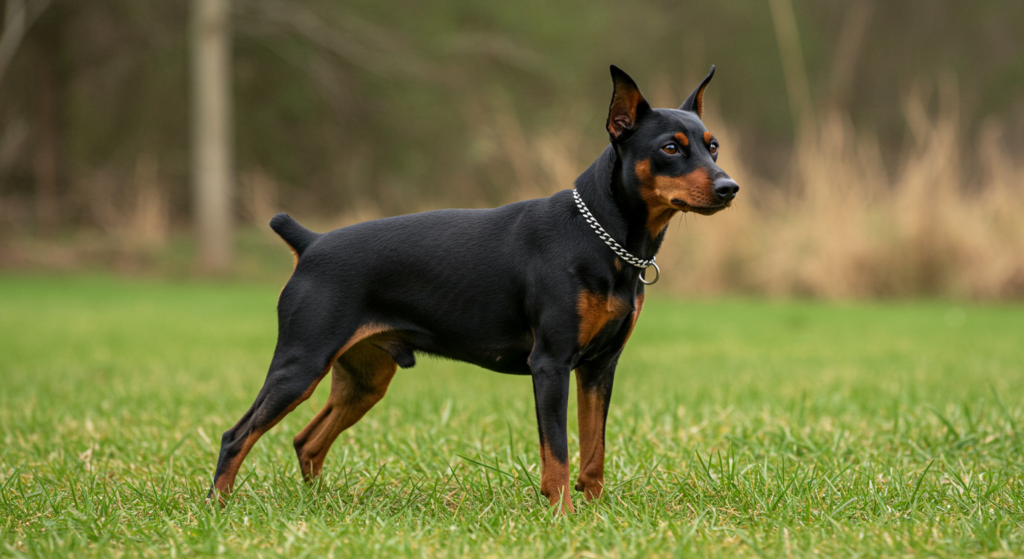Table of Contents
- Introduction
- General Care for German Pinschers
- Health Issues in German Pinschers
- Feeding Your German Pinscher
- Behavior and Training Tips
- Grooming Guide
- Considerations for Pet Parents
- Conclusion
- FAQs
- Tag List
- Meta Description
Introduction
The German Pinscher is a lively, intelligent, and versatile breed that originated in Germany. Known for their agility and strong work ethic, these dogs were historically bred to guard farms and hunt rodents. Despite nearly facing extinction after the World Wars, the breed was revived thanks to dedicated enthusiasts like Werner Jung. Today, German Pinschers are cherished for their playful energy, loyalty, and affectionate nature.
This guide will provide a comprehensive overview of how to care for a German Pinscher, including their health needs, dietary requirements, training tips, and grooming routines. Whether you’re a first-time owner or an experienced dog lover, this article will help you understand what it takes to raise a happy and healthy German Pinscher.

General Care for German Pinschers
German Pinschers are energetic and intelligent dogs that thrive in active households. They require plenty of physical and mental stimulation to stay happy and healthy.
- Exercise Needs: Daily vigorous walks, playtime, and enrichment activities are essential. A fenced yard is recommended to safely accommodate their high energy levels.
- Socialization: Early and consistent socialization is crucial to ensure they get along well with children, other pets, and strangers.
- Training: Positive reinforcement methods work best for this breed. Keep training sessions short and engaging to hold their attention.
Health Issues in German Pinschers
While generally healthy, German Pinschers are prone to certain genetic conditions. Regular veterinary check-ups and preventive care are key to maintaining their well-being.
Common Health Problems
- Hip Dysplasia: A malformation of the hip joint that can cause pain and mobility issues. Weight management and joint supplements can help manage symptoms.
- Eye Conditions: Cataracts and corneal dystrophy are potential concerns. Regular eye exams are recommended for early detection.
- Von Willebrand Disease (vWD): A hereditary bleeding disorder that affects blood clotting. Ensure your breeder tests for this condition.
Feeding Your German Pinscher
A balanced diet is essential to fuel the active lifestyle of a German Pinscher.
- Dietary Requirements: Choose high-quality dog food with real meat as the primary ingredient. Match the food to your dog’s life stage (puppy, adult, or senior).
- Feeding Schedule: Puppies should eat up to four small meals daily, while adults can be fed twice or three times a day. Avoid free-feeding to prevent obesity.
- Nutritional Supplements: Consider glucosamine, omega-3 fatty acids, and probiotics to support joint health, skin, and digestion.
Behavior and Training Tips
German Pinschers are known for their intelligence and playful nature. However, their independent streak requires consistent training and mental stimulation.
Personality and Temperament
- Energetic and adventurous
- Affectionate and loyal to their family
- Strong prey drive, requiring supervision around smaller pets
Training Recommendations
- Use positive reinforcement techniques.
- Engage in activities like agility training, obedience competitions, or scent work.
- Socialize early to prevent fearfulness or reactivity.
Grooming Guide
German Pinschers are low-maintenance when it comes to grooming, but regular care is still important.
- Coat Care: Brush their short, smooth coat weekly to remove loose hair. Increase brushing during seasonal shedding periods.
- Bathing: Bathe every 6–8 weeks using a gentle shampoo to avoid drying their skin.
- Ear and Eye Care: Clean ears weekly and check for signs of infection. Wipe eyes gently to remove debris and monitor for tear staining.
Considerations for Pet Parents
Before adopting a German Pinscher, ensure you can meet their needs:
- They thrive in active households with plenty of space to run and play.
- Their high energy levels require dedicated time for exercise and training.
- They may not be suitable for homes with small pets due to their prey drive.
Conclusion
The German Pinscher is a spirited and affectionate breed that makes an excellent companion for active families. With proper care, training, and socialization, these dogs can thrive and bring joy to their households. If you’re ready to commit to their energetic lifestyle, a German Pinscher can be a loyal and loving addition to your family.
FAQs
1. Is a German Pinscher the same as a Doberman?
No, German Pinschers and Dobermans are distinct breeds. Dobermans are larger and leaner, while German Pinschers are more compact with shorter snouts.
2. Do German Pinschers drool a lot?
No, they are not known for excessive drooling. They may drool slightly when excited or hungry.
3. Are German Pinschers easy to train?
Their intelligence makes them moderately easy to train, but their independent nature requires patience and consistency.
4. Are German Pinschers affectionate?
Yes, they are deeply loyal and affectionate with their families, often showering them with love and cuddles.
